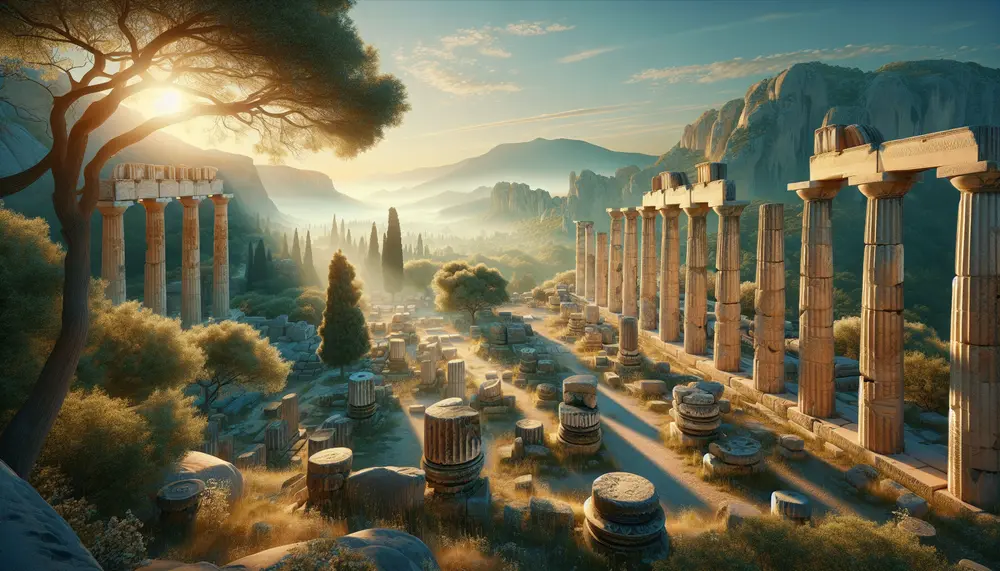Table of Contents:
Introduction: Exploring the Ancient Marvels of Greece
Greece, a land steeped in history, offers a journey through time with its ancient sites. These landmarks are not just ruins; they are gateways to understanding the rich tapestry of human civilization. From the towering columns of the Acropolis to the sacred grounds of Delphi, each site tells a story of gods, heroes, and everyday life in antiquity. As you walk through these historical marvels, you will uncover the layers of history that have shaped modern culture. This exploration promises a profound connection to the past, offering insights into the art, philosophy, and innovations that originated in this cradle of Western civilization.
The Acropolis of Athens: A Symbol of Western Civilization
The Acropolis of Athens stands as a testament to the ingenuity and artistry of ancient Greece. Perched on a rocky hill, this iconic site is home to several architectural masterpieces, including the Parthenon, the Erechtheion, and the Temple of Athena Nike. These structures, crafted from marble, reflect the advanced engineering and aesthetic sensibilities of their creators.
Visiting the Acropolis offers a glimpse into the heart of Athenian life during its golden age. The Parthenon, dedicated to the goddess Athena, showcases the Doric order of architecture and serves as a symbol of Athenian democracy and power. Meanwhile, the Erechtheion, with its famous Caryatids, highlights the blend of myth and function in Greek design.
As you explore this ancient citadel, you'll not only admire its beauty but also appreciate its enduring influence on art and architecture worldwide. The Acropolis is more than a historical site; it is a symbol of the cultural and intellectual achievements that have shaped Western civilization.
Historic Sites of Greece: Highlights and Significance
| Site | Highlights | Significance |
|---|---|---|
| The Acropolis of Athens | Parthenon, Erechtheion, Temple of Athena Nike | Symbol of Western civilization and Greek democracy |
| Delphi | Oracle of Delphi, Temple of Apollo | Center of the world for ancient Greeks, cultural hub |
| Olympia | Temple of Zeus, Ancient Stadium | Birthplace of the Olympic Games |
| Epidaurus | Theater, Healing Sanctuary | Remarkable acoustics, center for healing |
| Knossos | Minoan Palace, Labyrinth | Legendary heart of the Minoan civilization |
| Mycenae | Lion Gate, Tholos Tombs | Home of ancient legends like King Agamemnon |
| Corinth | Temple of Apollo, Diolkos | Crossroads of ancient trade and commerce |
Delphi: The Navel of the World
Delphi, nestled on the slopes of Mount Parnassus, was once considered the center of the world by the ancient Greeks. This sacred site was home to the Oracle of Delphi, where pilgrims from across the Mediterranean sought guidance from the god Apollo. The Pythia, a priestess, delivered cryptic prophecies that influenced decisions in politics, war, and personal matters.
Walking through Delphi, you'll encounter the remnants of the Temple of Apollo, where the oracle's pronouncements echoed through history. The site also features a well-preserved theater, offering stunning views of the surrounding landscape, and the ancient stadium, which hosted the Pythian Games, a precursor to the modern Olympics.
Delphi's significance extends beyond its religious role; it was a hub of culture and learning. The Delphi Archaeological Museum houses artifacts that provide insight into the art and daily life of the time. Visiting Delphi is a journey into the spiritual and cultural heart of ancient Greece, offering a profound connection to its storied past.
The Ancient Ruins of Olympia: Birthplace of the Olympic Games
Olympia, a serene site in the Peloponnese, is renowned as the birthplace of the Olympic Games. These ancient games, held every four years, were a pivotal event in Greek society, celebrating athletic prowess and fostering unity among city-states. Athletes competed in various disciplines, from running and wrestling to chariot racing, striving for glory and honor.
The ruins of Olympia offer a fascinating glimpse into this ancient tradition. The site includes the remains of the grand Temple of Zeus, once housing a massive statue of the god, one of the Seven Wonders of the Ancient World. Nearby, the Temple of Hera stands as one of the oldest monumental temples in Greece.
Visitors can explore the ancient stadium, where the original Olympic events took place, and imagine the roar of the crowd as athletes crossed the finish line. The Olympia Archaeological Museum complements the experience, showcasing artifacts that illustrate the cultural and historical significance of the games. A visit to Olympia is a journey into the spirit of competition and the enduring legacy of the Olympic ideal.
Epidaurus: Theater and Healing Sanctuary
Epidaurus, nestled in the Argolid region, is celebrated for its remarkable theater and its role as a healing sanctuary. The ancient theater, renowned for its exceptional acoustics, continues to host performances, allowing visitors to experience the magic of Greek drama in its original setting. This architectural marvel, with its harmonious proportions, reflects the Greeks' deep understanding of sound and space.
Beyond the theater, Epidaurus was a center for healing, dedicated to Asclepius, the god of medicine. Pilgrims flocked to the sanctuary seeking cures for their ailments, engaging in rituals and treatments that combined spirituality with early medical practices. The site included a tholos, a circular building with mysterious underground passages, and an abaton, where patients would sleep and await divine dreams for healing.
Exploring Epidaurus offers insight into the holistic approach of the ancient Greeks, blending art, spirituality, and medicine. It stands as a testament to their belief in the interconnectedness of body, mind, and soul, providing a unique perspective on ancient wellness practices.
Knossos: Mythical Palace of the Minoans
Knossos, located on the island of Crete, is the legendary heart of the Minoan civilization. This ancient palace complex is steeped in myth, most famously associated with the labyrinth and the Minotaur. As you wander through its ruins, you can imagine the vibrant life that once filled its halls.
The palace of Knossos is a sprawling site, featuring a maze of rooms, grand staircases, and intricate frescoes that depict scenes of nature and ritual. These artworks provide a glimpse into the sophisticated culture and artistic achievements of the Minoans. The complex's advanced architectural features, such as its complex drainage system, highlight the ingenuity of this early civilization.
Knossos is more than a historical site; it is a portal to the myths and legends that have captured imaginations for centuries. Visiting Knossos allows you to step into a world where history and mythology intertwine, offering a unique perspective on the origins of European culture.
Mycenae: Home of Ancient Legends
Mycenae, a powerful city of the ancient world, is famed for its association with legendary figures like King Agamemnon, a central character in the tales of the Trojan War. This archaeological site, nestled in the hills of the Peloponnese, offers a fascinating look into the Mycenaean civilization, which dominated Greece in the late Bronze Age.
Visitors to Mycenae can explore the imposing Lion Gate, the grand entrance to the citadel, adorned with the oldest monumental sculpture in Europe. Inside, the ruins reveal a complex of royal palaces, grave circles, and the iconic beehive-shaped tholos tombs, known as the Treasury of Atreus. These structures highlight the architectural prowess and the wealth of the Mycenaean rulers.
Walking through Mycenae, you are transported to a world of epic sagas and heroic deeds. The site not only sheds light on the historical basis of Greek mythology but also provides insights into the cultural and political dynamics of ancient Greece. Mycenae remains a captivating destination for those seeking to connect with the legendary past of this storied land.
Corinth: Crossroads of Ancient Trade
Corinth, strategically located between mainland Greece and the Peloponnese, was a bustling hub of ancient trade and commerce. This city played a crucial role in connecting various cultures and economies, making it one of the wealthiest and most influential cities of its time.
Exploring Corinth, you'll discover the remnants of its rich history, including the Temple of Apollo, which stands as a testament to the city's religious and cultural significance. The ancient agora, or marketplace, reveals the vibrant economic activity that once thrived here, where merchants from across the Mediterranean exchanged goods and ideas.
Corinth was also known for the diolkos, an ingenious paved trackway that allowed ships to be transported overland across the Isthmus of Corinth, significantly reducing travel time between the Aegean and Ionian Seas. This innovation underscores Corinth's pivotal role in ancient maritime trade.
Visiting Corinth offers a unique insight into the dynamics of ancient trade and the cultural exchanges that shaped the classical world. It remains a fascinating destination for those interested in the economic and social history of Greece.
Fazit: Embracing Greece's Timeless Legacy
In conclusion, exploring the ancient sites of Greece is more than a journey through ruins; it is an immersion into the very essence of Western civilization. Each site, from the sacred grounds of Delphi to the bustling trade center of Corinth, offers a unique narrative that contributes to our understanding of history, culture, and human achievement.
These ancient landmarks are not just relics of the past; they are vibrant stories that continue to inspire and educate. They remind us of the enduring legacy of Greek civilization, whose influence is still felt in modern art, philosophy, and governance.
By visiting these historical treasures, we embrace a timeless legacy that connects us to the past and informs our present. Greece's ancient sites are a testament to the creativity, resilience, and spirit of a people whose contributions have shaped the world as we know it today.
FAQ on Exploring Greece's Ancient Wonders
What is the significance of the Acropolis of Athens?
The Acropolis of Athens is a symbol of Western civilization and Greek democracy, showcasing architectural masterpieces like the Parthenon and the Erechtheion.
Why was Delphi known as the center of the ancient world?
Delphi was home to the Oracle of Delphi, where people sought guidance from Apollo. It served as a religious, cultural, and learning hub in ancient Greece.
What makes Olympia significant in ancient Greek history?
Olympia is known as the birthplace of the Olympic Games, celebrating athletic prowess and unity among city-states. It hosted various sports and housed the grand Temple of Zeus.
What was Epidaurus famous for?
Epidaurus is renowned for its remarkable theater with exceptional acoustics and as a healing sanctuary dedicated to Asclepius, the god of medicine.
How does Knossos contribute to our understanding of ancient civilizations?
Knossos, the heart of the Minoan civilization, offers insights into mythological stories and advanced architectural and artistic achievements of the Minoans.



